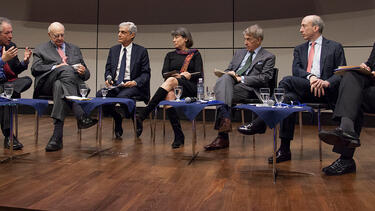Finance
The Corporation Is Centuries Older than We Thought
The genesis of the joint-stock company is usually traced to the founding of the English East India Company and the Dutch East India Company around 1600. New research co-authored by Prof. William Goetzmann says this origin story may be off by centuries.

Can We Fix the Financial System?
Six highly influential policymakers surveyed the current state of the world’s major financial institutions and discussed how to prevent another crisis.

What Should Finance Do for Society?
The financial crisis of 2008 is a looming figure in current economic thinking. The global economy is still slowly recovering from the shock, and policymakers and academics continue to discuss the structural changes needed to prevent a recurrence. The stress of the last half decade has made two things very clear: A productive and innovative financial system is essential to the broader economy, but financial innovations made irresponsibly—without consideration of systemic risk and other impacts on society—can wreak havoc.
Can We Prevent Future Crises?
Was the 2008 financial crisis a one-time event or the first example of a new pattern? Professor Gary Gorton argues that the history of banking shows that there’s a real risk of future upheaval in financial markets.

Can impact investing have an impact?
Impact investing, a growing niche in finance, seeks to marry strong financial returns with positive social impacts. That can mean investing in companies whose products improve the environment, or it can mean helping a startup find ways to positively contribute to the neighborhood where it’s based. Nancy Pfund ’82, founder and managing partner of DBL Investors, talks about the growth of the sector.
Predicting Financial Markets
The increasing complexity of financial instruments, the growing globalization of markets, and the increasing scale of major financial institutions all collided in the financial crisis of 2008. Has the crisis changed the markets for good? Should we expect major shifts in the long-term returns and volatility of different asset classes? What are the long-term consequences of automated trading, globalization, and other macro-trends?
Robert Shiller: Owning a Home Isn’t Always a Virtue
In the New York Times, Professor Robert Shiller writes that the United States should reduce government subsidies for homeownership, while finding another way to promote household saving.
How much has investment banking really changed?
The investment banking industry has been subject to new scrutiny, increased regulation, and changing capital requirements since the financial crisis of 2008. How much has this changed what bankers do? Yale Insights spoke with industry veteran Fred Terrell '82.
What are the forces changing the banking industry?
John Shrewsberry, the president of Wells Fargo Securities, outlines how government regulation and the ongoing tight credit environment are affecting the banking industry—and how big banks can keep up with the rapid pace of change today.
What are the realities of microfinance?
New research is debunking myths about microfinance and showing how organizations can effectively address problems associated with poverty. Yale faculty Dean Karlan, Tony Sheldon, and Rodrigo Canales discuss the problems and the promise in the field of microfinance and the lessons for other kinds of social enterprise.
Does focusing on shareholder value hurt shareholder value?
Shareholders own the corporation, so managers should maximize returns for shareholders, right? Corporate law expert Lynn Stout says that there are problems with this argument, starting with the fact that legally shareholders don't own a corporation. On top of that, she says, prioritization of shareholder value harms returns in the long run.